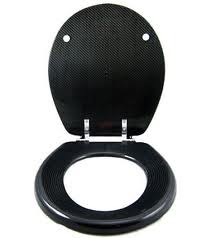The Great Toilet Seat Debate
When I read Lindsy Van Gelder’s “The Great Personhole Cover Debate,” I was seventeen and in my last year of high school. I remember the essay so well. It opened my eyes to the obvious injustices of gendered language that exist in my everyday—injustices that I had never noticed or worried about until that moment.
And, as a lover of words, I was ashamed of this fact. I remember thinking that it wasn’t that I had been kept blissfully ignorant, but that I had been fooled into acceptance of a so-called “normal” lexicon by an overwhelmingly patriarchal society as the status quo. I am quite sure that this article (along with Virginia Woolf’s books) are what sparked the beginnings of an understanding of feminism in my life. And, the fire still rumbles on…
I grew up in a family of four and my father was the only male. He was outnumbered. And so, the issue of toilet seats being put down after his use was, well, never an issue. I guess feminism reigned in our household. Or was it just Western manners? Western habits?
So, when I started to live with a guy for the first time in my life, I found myself utterly shocked to have to request that my partner put the seat down after he finished using the facilities. Quite literally, I was dumbfounded! To me, it embodied everything about being with a man that I didn’t like. If he couldn’t put down the toilet seat for me, was he ever going to be able to do anything for me? To think that I should even have to ask! Was he going to betray me next? It embodied so much, for some reason, like a great signifier of his loyalty and devotion. And so, it was a no-brainer that he should change his habits now that he was living with a woman—living with me! Is was obvious!
Right?
Wrong.
In Chinese culture, toilets like Western ones (the sit-down kind) are fairly new. The squat toilet was the standard for many, many years and still are the norm in public facilities. Only modern apartments that were constructed in the last twenty years (or so) were equipped with the sit-down thrones. This is because they were (and still are) considered to be much less sanitary than the squatters. With your body actually touching the commode, diseases are more easily transmitted and so Chinese people, even now, consider the squat toilets to be the more hygienic choice when needing to eliminate publicly.
When out in the world of Beijing even nowadays, it’s not uncommon to see sit-down toilets with shoeprints on their seats. That’s because people use them as squatters. They stand up on them and then squat down to use them as if they’re just elevated squat toilets. So, sitting down on a sit-down toilet in Beijing is something that anyone should only do at their own risk. Why make contact with what the sole of a shoe has already contacted in a big, over-populated city?
[I’m a “hoverer” at the best of times!]
Even with knowing all of this, when I went to my mother-in-law’s place I was still surprised to find the toilet seat up rather than down, even though my father-in-law is not currently there with her. Why? Well, she doesn’t feel the seat is clean enough for her to sit on. It’s a rental apartment, after all. Until she replaces the seat with a brand new one, she says, she’s not letting it touch her bottom. I guess she engages in the partial squat/hovering technique too, even at home!
Now, add to this phenomenon centuries of patriarchy in China and we have yet another layer to the mystery. Modern Chinese women, within the privacy of their own homes, actually have a tendency to raise the seat for the convenience of their men! Exactly the opposite to the Western way of men lowering the seat to accommodate their women. What!?
And then we arrive at my relationship with Guo Jian.
Our first encounter about this problem had him assuring me he’d try to remember and then actually doing it only when I yelled at him from outside the bathroom when he was peeing. He would hastily slam down the seat. It was pretty clear he really didn’t care.
And that pissed me off. (No pin intended!)
He accused me of focusing on something trivial and wasting time “fighting about nothing.” My response? In Lindsy’s words:
“I would like to know how anything that gets people so defensive and resistant can possibly be called ‘trivial,’ whatever else it might be.”
I couldn’t let it go. I wouldn’t let it go. The third dialogue about it showed me once and for all that he really felt this was a non-issue. He seemed shocked that I should be so offended by something so minor as a toilet seat and he mocked my feminism. I sidestepped the feminist slag and said, “It’s gross! I don’t want to touch it!”
Then he paused. He looked at me squarely, saying, “But, wait a second, I have to touch it to lift it up each time! Why can’t you touch it to lower it down again? Then we’re even!”
And…. I was stumped.
The logic was, well, logical.
Similar to that feeling I had at seventeen when I read Lindsy Van Gelder’s essay, I started to doubt my status quo that forced men to cater to the women rather than a balanced co-caring model. I wondered, though, if that was even possible in a patriarchy; after all, women are still oppressed by men and so, while that’s a reality, is a real balance ever possible? Shouldn’t men pick up the slack?
I felt trapped by his logic on one side while roasting against my feminist flames on the other, cornered over here in Beijing with my new male partner and the disgusting task of having to lower a toilet seat—something I had never had to do my whole life!
I struggled over this for weeks. I knew there had to be a reason why it wasn’t fair. Why would a whole culture of men (in the West) have succumbed to putting the seat down for women if it wasn’t just and respectful? What element was I missing to the argument? I simply couldn’t forfeit the debate until I had discovered the crux of my remaining rebuttal. I knew it had to be somewhere.
And then, one night, I found it.
It was about three in the morning and I had had too much water before bed. I got up and stumbled out of bed for the bathroom. I didn’t turn on any lights because I was half asleep. I stood in the dim of the bathroom, lowered my pajama bottoms, sat down on the toilet, and…
I fell into the bowl.
The seat had been up. You know who left it that way.
My ass was now all the way down into the toilet, touching the water, my feet had flown up from under me, and I had to put both palms on the sweaty edges of that exposed bowl to counter-lever my body out of the toilet’s hungry jaws. By the time I had fished myself out, I was retching inwardly at the reality of my whole ass and palms that were now covered with toilet film.
Needless to say, I was fully awake.
AND ANGRY.
I had to turn on the light, take off my clothes, pad my naked self down to the kitchen to turn on the hot water valve, pad myself back up to the bathroom, turn on the shower, wait for the hot water to kick in, and then wash my lower regions and hands (and everywhere else by then) until I was satisfied that I wasn’t bringing any part of the toilet back to bed with me.
And when I got back to bed, my “great toilet seat debate” opponent was snoring peacefully. I resisted the urge to get a bucket of toilet water and splash him awake with it. And that was just to protect the bed I was also sleeping in, not magnanimity!
The next day, as soon as he woke up, I had my argument planned and ready to fire:
“The reason you should put the seat down,” I barked, “is that you almost never have to sit on it. Last night, I almost died. The toilet nearly swallowed me!” I was serious but he was already laughing. “You left the seat up and in the dark, I fell in. Do you understand what I’m saying? It’s dangerous! In the dark, I need to know that I’ll be safe! If you had the risk of getting all of my pee and poo germs on your body if I didn’t put the seat down, you’d want me to put the seat down too! It’s not fair! I have to sit every time!” Trying to get through his merriment to the seriousness of the issue, the forcefulness of my approach had dwindled into a whine.
He was laughing too hard to concede that I was right. Still, I didn’t let up until he agreed to try harder to put it down. I left the conversation fuming about it, but especially because I had failed to elicit any sympathy, much less an apology.
I admit that I almost considered breaking up with him over this.
It did get slightly better, I must admit, which was his silent concession. And then I decided on another and final tactic. I took a permanent marker, looked up the words in the dictionary, and wrote in Chinese on the underside of the toilet seat: “Please put seat down after use!”
Well… if I had only known that this would be the source of many laughs from the bathroom by his male friends—even his father. They’d emerge, chuckling, asking, “Who wrote that? It’s funny!” and I’d go in only to find that the funny joke was still staring at me in the face, the seat still up—the instruction had been ignored and only its unintended humour had been conveyed!
And this is where we’re at today. About half of the time, the toilet seat is down. Luckily, we have two bathrooms and mine is generally the safer one (upstairs). When Western friends come over, he’s very good about remembering to put the seat down. When his friends come over, I’m better at remembering to look first before sitting because the seat is invariably up. We seem to have struck the semblances of a compromise.
No one has won the debate, I’m afraid. Sometimes I feel like I’m the victim of a cruel joke that is symbolized by this toilet seat war—the joke’s on me for falling in love with this particular male in a world of millions of options. I mean, I realize that his gender expression is really fluid, that he and I are more alike than many queer or LGBT identified women I have met, but I still have to admit:
I’d be happier if he sat down to pee. Seriously. So much less messy.
And it would mean no more toilet seat debate.
He refuses, of course. He’s a man, he says, and no woman is going to make him sit down to pee!
He may as well have beat on his own chest like King Kong when he announced this.
You’d think I’d asked him to wear a dress now and then…








